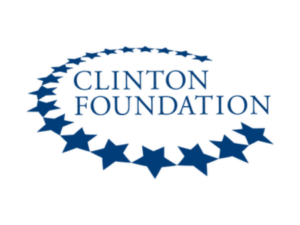
Haiti and the failed promise of US aid
Since Haiti’s catastrophic earthquake in 2010, the US has spent $2.3 billion in aid money that has failed to alleviate
The Peace and Security Funders Group connects and supports the global community of funders advancing peace and security efforts in order to build a more peaceful, just, and equitable world.
Cath Thompson of Peace and Security Funders Group (PSFG) spoke with Alec Saelens on January 25, 2024. Click here to read the full conversation with insights highlighted.
Alec Saelens: If you could please introduce yourself and describe the work of your organization, the problem that you’re addressing, and how you’re responding to it.
Cath Thompson: The very first thing I want to say is that I really appreciate what you, the Solutions Journalism Network and Skoll are doing because I feel like, especially when it comes to the type of work that we do in peace and security and peacebuilding, it is all too easy to get discouraged these days with the work around conflict prevention, atrocities prevention, saving lives. There’s a great deal of discouragement these days, but I feel studying case studies of what is working and wins can be remoralizing. It shows people that, “Okay, this is possible in the face of impossible odds.” There’s work that can be done, and especially for funders, you can fund things that make a real difference. So I appreciate this and the frame that you are taking to it.
I also want to say that what I will say in this interview are my own views and don’t necessarily represent those of the Peace and Security Group (PSFG) members.
To answer your question, I am the Managing Director at the Peace and Security Funders Group (PSFG), which has been around since 2000. PSFG is a global community of funders and individual philanthropists who are all invested in peace and security at home and abroad, whatever that means for them. They’re interested in building a more peaceful, a more just, a more equitable world, and they want to be in relationship with other funders who are trying to figure out this work together. The Skoll Foundation originally joined back as the Skoll Global Threats Fund, and now is a member of my organization as the Skoll Foundation. We have 55 members now, and they work on a huge range of issues from nuclear nonproliferation to cyber security and AI to support for locally-led peacebuilding to women, peace and security, to the whole gamut.
Our work is to support them to better communicate and coordinate so that they can be more aligned and more effective so that they can be better partners to their grantee partners and hopefully make their lives easier as they do this hard work of building peace. In a sense, we are not a traditional grantee of the Skoll Foundation. They are a member of our organization and they do support us, but we see ourselves as a partner in the work with them and with other funders to support the field of peace and security more broadly.
Alec Saelens: Who are the main stakeholders of your work? Who benefits from what you do and how do they benefit?
Cath Thompson: Our members are our main focus and the members are the Skoll Foundation and their peer funders. So large and small foundations, individual philanthropists, and other types of giving vehicles. Our theory of change is that systems change happens through the growth and support of individuals. We focus on individuals who work in philanthropy — specifically in peace and security philanthropy — to help them grow their networks, their knowledge, their skills, so that as they grow in the work and as they grow as the field changes, that they’re doing strong work in support of their grantee partners who are often on the front lines of conflict. But we see that our comparative advantage, our focus is on the funders themselves and their practices, their grant-making, their collaborative efforts, and how we might support that.
Alec Saelens: Would you be able to give me a couple of examples of what your work entails and how that has benefited one of your members and further downstream also the sector, the peace and security field?
Cath Thompson: I’ll take a step back and say that it’s important to work on peace and security because the world is growing less stable. Full stop. The Institute for Economics and Peace puts out a peace index every year, and actually last year was the deadliest year for armed conflict since the 1994 Rwandan genocide. Things are getting more violent and less stable in a sense, and of course, social and political factors around the world are causing more and more complications on that front. Peace is important and it’s important to invest in that. Where we see our impact is when we support funders to do stronger work together than they would do alone. For example, I just recently heard of one of our members, a large foundation, starting to support a small local NGO because they met another funder through PSFG that is committed to working locally.
These two foundations that never otherwise would’ve talked about this are now co-supporting local actors. Another example is two funders that met through PSFG realized they have a mutual interest in the intersection of climate change and peace, and now they’re collaborating on work to help this snowball and grow. Or when I hear of funders who are keenly interested in a specific topic or a specific country that might be under-resourced or forgotten, working together because they met through PSFG. Or when I hear of funders who, via PSFG, learn about how to do their grant-making better, how to center equity, how to reckon with colonialism and white supremacy within our field, and they’re wrestling with that together because there are unique challenges with regards to working in the foundation world.
When I hear about funders meeting through PSFG having meaningful interactions and conversations because of PSFG and then that having ripple effects to the field of grantee partners in terms of them improving their own practices with their partners or improving internal practices within the organization or beginning to co-fund things, that may seem like a small impact, but it feels major and I can talk more about this later, but it is because so much happens via relationship building in this world.
Alec Saelens: In terms of the activities that you work on in order to foster those connections between members, do you have a set of practices, events, or activity tracks that you’ve set up in order to create those relationships?
Cath Thompson: We host a whole bunch of events. We have several working groups on specific topics. We host ad hoc events as things come up, as it always does if you’re working on the issues that are on the front page of the newspapers, the needs will always be changing. We host a learning series, we host small group cohort programs. We host a ton of things. But what I think is most important to say on this is that the beauty is in the design. Tons of organizations host tons of events all the time and it is valuable for learning and network building, et cetera.
But one thing that we have learned over the past several years is that we need to be designing our events with such deep intention to bring folks together to have the conversations that they cannot get elsewhere, to not be reinventing the wheel, and to create spaces where people know they belong, they can find their people, and they can also have these challenging and expansive conversations that lead to social change. So that, we see as the core of our work, is not just to design a whole bunch of programs, but to design them well, to bring the right people around the table together.
Alec Saelens: What is distinct about your approach when it comes to convening those events and intentionally creating the space and the guidelines in order to foster those conversations that people would not be able to have elsewhere?
Cath Thompson: In networks, the strength is in the collective wisdom of the participants. One of my colleagues said to me recently, “If PSFG members can just watch the recording after an event and get out of it as much as they would have if they had participated in real time, then we’ve done them a disservice.” So we try to design things so that we are both addressing the power dynamics that are inherent in the field of philanthropy and trying to dismantle some of that and also making it very valuable to people where they walk away knowing at least one new person, for example, or knowing something new, or engaging in self-reflection that helps them improve their own work. We do a lot of that and focus on that. I think the spaces that I am in outside of PSFG, the ones where I feel like I am seen and known by other people and I can trust these people, are the ones that I find most valuable and am most likely to collaborate further.
Alec Saelens: How do you measure the success of your work? What kind of evidence do you seek in order to understand that you’re making progress?
Cath Thompson: We have a whole monitoring & evaluation rubric, but I think the heart of that is hearing from our members whether their engagement within the network is valuable and then how they got value, and most especially how they improved their work because of participation in PSFG; how they better supported their grantee partners because of their participation in PSFG.
Not all of our members are funders with grantees because there are different ways that foundations are set up. Some of them don’t give grants, but pretty much all of them have partners. They work in partnership with folks. So how can funders be better partners understanding that there are power dynamics at play, understanding that issues of equity are always central? To answer your question, how do we know that we’ve had impact? It’s what we hear from our members especially, but also from the broader field of peace and security.
Alec Saelens: How do you get that information? Do you have surveys? Do you run specific interviews with your members?
Cath Thompson: The short answer is, yes, we do surveys after every event, and we do surveys of our whole membership once a year. Everyone has survey fatigue. That’s why we take this multi-pronged approach on the questions that we’re trying to assess. Whereas we do survey folks, we also host one-on-one conversations with every member at least once a year, and oftentimes more than that, to hear nuanced feedback from them on what’s working, what’s not working, what’s useful, what connections have you made, how can we better support you. So it’s relational at the end. We do gather quantitative data and we gather qualitative data, but it’s within this container of relationship and trust so that the feedback can be honest.
Alec Saelens: One of the reasons I’m asking is because, as I mentioned, my work involves measuring impact, so I’m always eager to hear how organizations in this space of systems change and social innovation that involve particularly networks get to that information both qualitative and quantitative. I appreciate you drilling into these responses.
Cath Thompson: It’s a tricky beast and a lot of it comes down to contribution versus attribution and what can we say that we contributed to and what do we know we directly caused. It has been a learning journey because, like I said, we’re not a direct grantee working with beneficiaries, for example. We’re a network.
I think impact measurement is particularly difficult in the field of peace and security. Can we say that we prevented a conflict or how many lives were saved? It’s been so hard.
I think it’s about how we tell the stories of our work and that even if conflict is cyclical, even if it’s discouraging on how you thought something was resolved and apparently it’s not again, and people are again losing their lives, it is still worth investing in. Peace is still worth investing in because you do not know the trajectory of the lives of the people whose lives are saved, for example. And the trajectory of social change is hard to foresee and your investment can change the course of a life or of a society or of a country, etc. I could say a lot more on that too, but I think folks get discouraged around the impact measurement piece when it comes to peace and security, but they shouldn’t.
Alec Saelens: What other challenges do you face in day-to-day activities?
Cath Thompson: Certainly telling the story of impact is something that the peace field could do better at. Again, there are folks who are doing a really good job at that, both on the qualitative and the quantitative side, but it’s very context-dependent. The metrics that work in one place might not work in a different place or on one topic might not work on a different topic.
The biggest challenge, of course, is that there is conflict, and conflict appears to be increasing. There are social movements that may or may not be effective in the face of authoritarian takeover and democratic backsliding. There are really concerning trends on a global scale.
At the same time, it appears that funding for peace and security and conflict prevention is reducing. We’ve noticed this with several large foundations shuttering their peace-related programs and security programs or shifting their funding elsewhere, but also vis-à-vis bilateral funding, government funding reducing.
A lot of European governments who are big funders of peace and conflict prevention are reducing their budgets. We’re concerned that this narrowly defined peace and security field will atrophy and that will have impact both on the practitioners, those who are at the front lines of conflict, as they’ll have less money to do the work, but also on the funders like the Skoll Foundation who will have consequently more pressure on them to support the field and to hold onto the gains that we have made. I think writ large, the challenges on funding peace are only going to grow, especially in the face of things changing globally.
Alec Saelens: What do you think are the strategies that keep people engaged effectively in the face of a reduction of interest in funding for this space?
Cath Thompson: One thing I would say, our theory of change is that systems change happens through organizations, happens through individuals because ultimately, it’s individuals who are the architects of this change. Geopolitical shifts occur, peace processes are brokered because of individual choices. If those individuals are empowered, if there are inclusive processes, if folks who have been pushed to the margins are able to participate, it makes for better outcomes. There is research that says that peace processes that include women, for example, are more likely to stick, it’ll last longer. So it is worth attending to the individual work in order to build systems change. Likewise, it is important to build up individual knowledge, capacity, and networks so that folks know who they can call upon for help and for support in order to collaborate on a bigger systems-level issue.
One funder alone, for example, or one individual alone, one well-intentioned individual alone, can’t stop a conflict somewhere. But several funders who are working together within a network of collaboration and trust can fund an ecosystem approach where one funder funds a research piece, and one funder funds the local peacebuilders, and another funder funds a communications piece. And they work together within an ecosystem to deeply look at one topic and find the solutions that they can come up with together. But that only happens because individuals know each other and they know who they can call upon and they know who they can work with. Institutions are quirky and every institution has their own priorities and timelines and things. So the more that we can help facilitate this relationship building, the more that we see it influences the systems-level change.
Alec Saelens: If there was an insight, if there was an element of a secret sauce that you needed to hone in on so that the work that you’re doing can be so replicated or enhanced, what would it be? What is the thing that you need to get right in order to be able to foster those connections between individuals and organizations that can then lead to larger ecosystem changes?
Cath Thompson: I guess I’m just going to repeat myself and say the relationships are critical for positive social change, but they must be nurtured. Occasionally, trust can just blossom, but oftentimes, trust needs to be fostered with intention and with care. There are ways to do this, especially amongst professional networks. Sometimes all you want from a network is to learn and that’s fine. Sometimes all you want from a network is friendship, and that’s fine too. But, isn’t it wonderful if you can have all of that and skills building to boot? And also, it’s important to know that your contribution to the network is valuable, that you have something to give, not just that you’re only taking and gaining, but also that you are a valuable contributor to that network. I think therein lies the secret sauce.
Not that we always do that perfectly, but that’s our goal, especially because we do work across such a wide breadth of topics related to peace and security, and there are always new topics emerging, AI, for example, and all the issues related to climate change, migration. All of these things are interconnected. We cannot be working in silos.
Unfortunately, philanthropy does tend to work in silos sometimes out of necessity. We necessarily have to put boundaries on what we are able to focus on and fund because we are limited. And as much as we can be working intersectionally and working in relationship with others who may lie outside of those boundaries, that makes our work stronger. So yeah, the secret sauce of getting anything done is trust.
Alec Saelens: You’ve mentioned the value of bringing people who are on the margins, people who are underrepresented, people who might not fit within certain circles of larger systems that have particular power dynamics, how do you bring them into the fold? How do you give them a seat at the table? How do you elicit their participation? How do you create that participatory framework?
Cath Thompson: Well, that could be a whole other conversation. How much time do you have? Centering equity is both one of PSFG’s goals and it is one of the values that is our North Star.
Several years ago we took stock about how inequity and exclusion are at the root of many, if not maybe all, real or perceived conflicts. If the world was equitable, there may not be war, potentially. There may not be violence in conflict. We can imagine a more beautiful future than we have currently, and that is a future that is equitable and inclusive.
As we thought about that, we thought, “What’s PSFG’s role and responsibility in addressing this because it is part and parcel of peacebuilding?” We’ve done a lot of work internally and externally with our members. Then hopefully that ripples out to the broader field to center equity and to reckon with the dynamics that are in our field and in our own institutions. Whether that be hosting a six-part learning series on decolonizing peace and security philanthropy and what that means, to hosting trainings on these issues, to the ways that we design our programs. Again, it comes back to intentional design such that foundation executives can sit in the same breakout room as junior staffers and have a meaningful conversation. That, I consider to be the tip of the iceberg of this kind of work.
I think it’s less about giving people a seat at the table and more about realizing what is the capacity that already exists here that has been covered over and just allowing that to flourish in safe and healthy ways. Obviously, there needs to be a lot of work done around psychological safety, which we do. Our thinking is that equity is central to peace and to peacebuilding. It’s not a nice-to-have, it’s not just a moral imperative, but we need to be looking at our own organizations, ourselves as individuals, and the field at large too.
Alec Saelens: Is there anything else that you would like to add, something that I didn’t quite ask about, something that you think would be really pertinent to this question of thinking about larger assistance change and what makes it tick?
Cath Thompson: Well, obviously, I’m very pro networks, pro relationships, so I guess if your readers of this piece are funders who are curious about how to make positive change in the world in the face of instability and conflict, PSFG is a welcoming place. I know your readers come from all sorts of corners of the world and many, many people doing a lot of good in different corners of social change, but just encouraging your readers to seek out the networks. It is work to participate in a network and to be in relationship with other people, but it can pay dividends. That’s my little pitch for networks.
It’s a really privileged space to be at the hub of a network and to see all the cool work that’s going on, as well as all the challenges. And connecting people who are wrestling with the same things but they don’t know each other, and suddenly now they’re collaborating and it’s amazing. For that, we have to attend to a lot of dynamics at the same time. That is really real.
Alec Saelens: Cath, thank you so much for your time. I really appreciate it.
Click here to read the full conversation with insights highlighted.
Alec Saelens is a former journalist who supports SJN and its partners track solutions journalism’s impact on society and the industry. In his former role, he researched and consulted on the connection between solutions journalism and revenue. He is co-founder of The Bristol Cable, the UK’s pioneering local media cooperative. Before SJN, he was a researcher and coach for the Membership Puzzle Project and an analyst for NewsGuard.
* This interview has been edited and condensed.
Find other organizations working towards global peace.
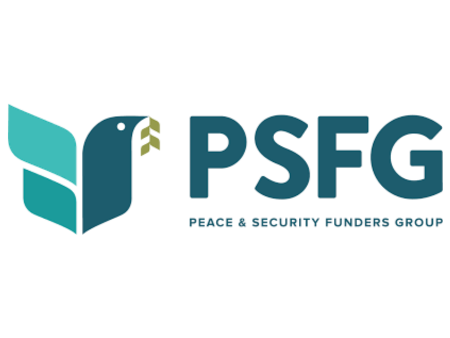

Since Haiti’s catastrophic earthquake in 2010, the US has spent $2.3 billion in aid money that has failed to alleviate
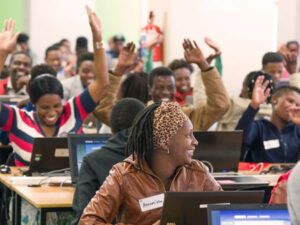
Harambee Youth Employment Accelerator helps young people succeed in their careers by coordinating “learning and earning opportunities” into pathways that
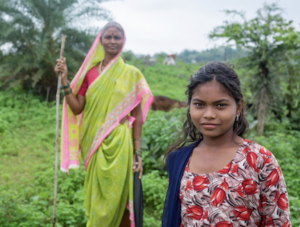
Grameen Foundation works with local organizations to bring resources and information to people experiencing poverty, particularly women and girls. Zubaida
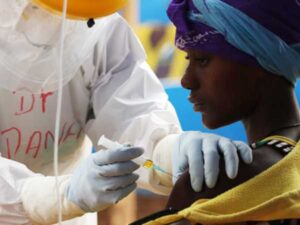
Although Haiti and Montana appear to be vastly different places, they have a few important things in common; they are

Search for Common Ground is a peacebuilding organization with the majority of its staff working in their home countries to
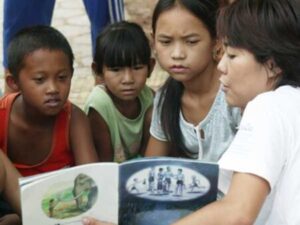
ChildSafe has trained hundreds of volunteer agents to identify at-risk children who may be in dangerous situations and intervene to